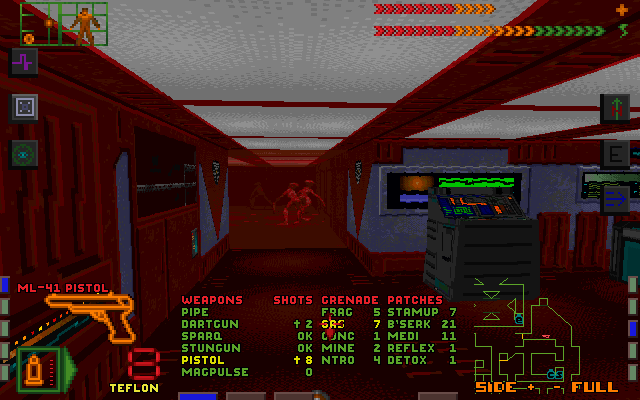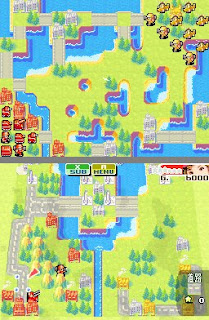70. Final Fantasy V (Squaresoft, 1992 in Japan)
There has been (and always will be) a lot of debate about which 16-bit Final Fantasy is the best, and to me, that answer will always be "Mystic Quest". I kid, I kid; put down the torches and pitchforks. The answer to me is V (keep them down), and that comes in large part due to the sheer genius of its gameplay. Returning to the choice-based system of Final Fantasy III, letting you pick any of thirty or so classes and change them at almost any time, it also allowed you for the first time in the series to mix-and-match abilities from those classes, letting you customize your party to an insane degree. Want a monk that can equip armor like a Knight? You can do it. A summoner that can use white magic? You can do that too. A thief who can wield axes? Yep, it's possible. It was even the debut of my favorite Final Fantasy class, the Blue Mage, who copies powerful-but-usually-expensive monster spells for later use. But most fun of all, your base Freelancer class keeps bonuses you've earned from classes you've mastered, becoming an uber-powerful juggernaut class at the end of the game. Sure, it's a bit uneven difficulty-wise and certainly not the best SNES RPG in terms of storytelling, but I was having too much fun with it to care. Final Fantasy V was great, is great and always will be great.
Shin Megami Tensei is a franchise known for three things - its branching story paths, allowing the player to recruit demons, and of course being brutally difficult, requiring a great amount of player commitment and many, many deaths and continues to complete. Nocturne is no different, providing a plethora of tricky dungeon puzzles, difficult bosses and all but requiring mastery of the game's fusion system and party customization to succeed. Still, its haunting dreamlike atmosphere, compelling storyline, interesting characters and replay value make it a game that, while it may make you curse a lot, also proves to be extremely rewarding once you batten down and commit yourself to it fully. Nocturne is Shin Megami Tensei - and Japanese RPGs - at their finest.
While Final Fantasies VII and VIII brought in many new fans to the franchise and helped put the Playstation 1 on the map, they left a lot of long-time fans of the franchise disillusioned for abandoning nearly every familiar element of their design. The ninth entry was Square's attempt to address that, combining the cinematic and graphical capabilities of the PS1 with gameplay, aesthetics and design much more reminiscent of the 8 and 16-bit entries. The end result was in a way the best and worst of both worlds, with a lot of the familiar job classes, abilities and overall balance returning, but still a lot of overlong spell animations, tedious minigames and a lot of lengthy, unskippable cutscenes and FMVs. Regardless, though, Final Fantasy IX did its job, charming fans of both Final Fantasy worlds and providing an RPG experience that easily ranks among the genre's best.
One of the first RPG released on the Playstation 2 was Dark Cloud, a game touted as a "Zelda Killer" by Sony despite the fact that the two really played nothing alike (and Dark Cloud lacked much of the polish of the game it set out to "kill"). Dark Cloud 2, however, was a significant overhaul to the gameplay, streamlining it in some respects (from six playable characters to 2, though each now wielded two weapons as well as a special ability), giving it more polish, and just a sheer amount of content with things like challenge medals, minigames, high quality voiceover and a much more colorful, cel-shaded palette on the whole. A long, but satisfying adventure with a constant sense of fun and wonder throughout.
Even as someone who was blown away by the early Marvel-Capcom crossover games, Marvel VS Capcom 2 managed to impress me on a level no other fighter had (and few others have since). With a roster of 56 playable characters, comprised of every character from previous crossover games and a handful of new ones, the same fast-paced gameplay that never misses a beat and teams of three (who can call in the other two characters to assist or chain Hyper Combos together for huge damage), the game is just a blast to play. I'm not a huge fan of the bizarre CGI backgrounds or the strange light jazz soundtrack they got for this crazy crossover fight, but in terms of gameplay it's still among the best fighters ever made.
Metal Slug X is a somewhat more polished reimagining of Metal Slug 2, eliminating much of its slowdown while remixing its gameplay with new enemy patterns and a slightly different boss order. For my money, though, it's also the best Metal Slug game ever made, with a perfect blend of design cues, destructible environments and that good old gorgeous 2D animation, not to mention one of the greatest final battles in video game history. This really is a title that must be experienced for any fan of arcade action.
62: Quake (Id Software, 1997)
Every modern FPS owes much to Doom, but with apologies to that classic, I have to say I much prefer Quake these days. It took some time to win me over, but after really taking in its atmosphere, gorgeously designed 3D maps, creepy enemies and relentlessly fast-paced design, it's pretty hard to go back. Moreso when it has some fantastic addons like Arcane Dimensions and the two official expansion packs that expand upon the experience in some pretty amazing ways, adding new some of the most well-crafted new enemies, stages and bosses I've seen in any FPS. Quake kicks ass and is the quintessential Id shooter from the 90s.









